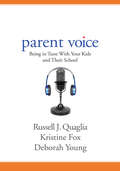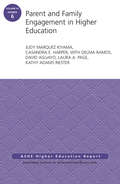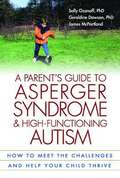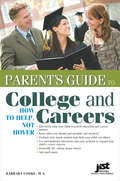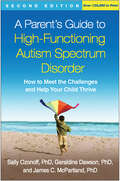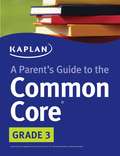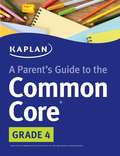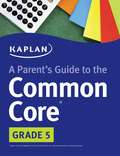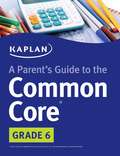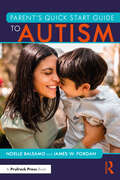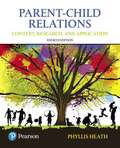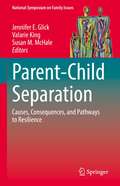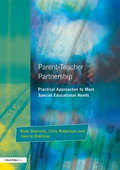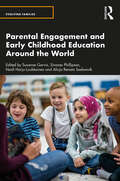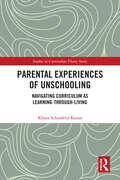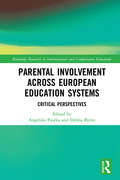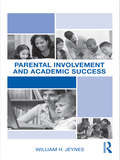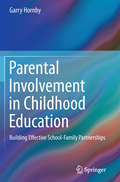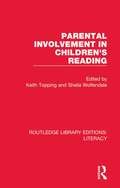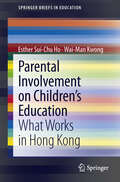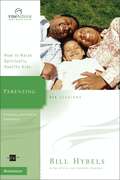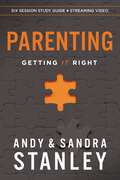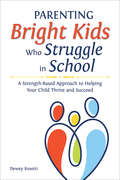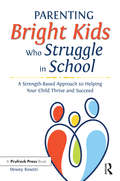- Table View
- List View
Parent Voice: Being in Tune With Your Kids and Their School
by Deborah J. Young Russell J. Quaglia Kristine FoxFind your best voice to inspire your child to reach their aspirations. With no single or right formula to teach, reassure, or help a child, no precise age gauge for first experiences, and blurry lines between clear, obvious, and gut decisions, how can a parent know what is best or right in the course of their child’s education? Parent Voice applies thought, experience, and a developmental model for parents to follow that allows for differences in personalities, dispositions, and supporting players. Real musings give real-life examples of parents positively influencing their child’s education Reflection questions encourage engagement and application Action items offer guides for each stage of a child’s development Be the guide and advocate your child needs by finding your best parent voice. "Parent Voice describes how to handle difficult situations with the "Listen, Learn, Lead" structure, and also offers solutions to prevent them in the first place. This book teaches parents how to use their voices in effective ways and how to give their children voice." Karen L. Tichy, Ed.D., Assistant Professor of Educational Leadership Saint Louis University, St. Louis, MO
Parent Voice: Being in Tune With Your Kids and Their School
by Deborah J. Young Russell J. Quaglia Kristine FoxFind your best voice to inspire your child to reach their aspirations. With no single or right formula to teach, reassure, or help a child, no precise age gauge for first experiences, and blurry lines between clear, obvious, and gut decisions, how can a parent know what is best or right in the course of their child’s education? Parent Voice applies thought, experience, and a developmental model for parents to follow that allows for differences in personalities, dispositions, and supporting players. Real musings give real-life examples of parents positively influencing their child’s education Reflection questions encourage engagement and application Action items offer guides for each stage of a child’s development Be the guide and advocate your child needs by finding your best parent voice. "Parent Voice describes how to handle difficult situations with the "Listen, Learn, Lead" structure, and also offers solutions to prevent them in the first place. This book teaches parents how to use their voices in effective ways and how to give their children voice." Karen L. Tichy, Ed.D., Assistant Professor of Educational Leadership Saint Louis University, St. Louis, MO
Parent and Family Engagement in Higher Education: AEHE Volume 41, Number 6 (J-B ASHE Higher Education Report Series (AEHE))
by Judy Marquez Kiyama Casandra E. Harper Delma Ramos David Aguayo Laura A. Page Kathy Adams RiesterGain a comprehensive understanding of the role that parents and families play in college students’ lives through their involvement starting with K–12, moving through the transition to college, and then focusing on the college experience itself.The authors broaden the conversation to reflect the actual and diverse array of parents and families that play vital roles in students’ collegiate experiences. Particular attention is paid to: diverse families, including students of color, first-generation college students, and low-income students, an agenda for more inclusive research, theories, and practices with the goal of broadening the conversation to reflect the diverse array of parent and family engagement, and standards, models, and best practices that might be applied more broadly and modified as needed. As a whole, this volume offers an expanded way of thinking about how higher education understands, engages, and serves the needs of parents and families. This is the 6th issue of the 41st volume of the Jossey-Bass series ASHE Higher Education Report. Each monograph is the definitive analysis of a tough higher education issue, based on thorough research of pertinent literature and institutional experiences. Topics are identified by a national survey. Noted practitioners and scholars are then commissioned to write the reports, with experts providing critical reviews of each manuscript before publication.
Parent's Guide to Asperger Syndrome and High-Functioning Autism
by Sally Ozonoff Geraldine DawsonAsperger Syndrome and high-functioning autism are detected earlier and more accurately today than ever before. Children and teens with these disorders often stand out for their precocious intelligence and language abilities--yet profound social difficulties can limit every aspect of their lives. This hopeful, compassionate guide shows parents how to work with their child's unique impairments and capabilities to help him or her learn to engage more fully with the world and live as self-sufficiently as possible. From leading experts in the field, the book is packed with practical ideas for helping children relate more comfortably to peers, learn the rules of appropriate behavior, and participate more fully in school and family life. It also explains what scientists currently know about autistic spectrum disorders and how they are diagnosed and treated. Real-life success stories, problem-solving ideas, and matter-of-fact advice on everything from educational placements to career planning make this an indispensable reference that families will turn to again and again.
Parent's Guide to College and Careers
by Barbara CookeThis upbeat handbook gives down-to-earth advice for parents who want to constructively help with their child's college and career planning, without micromanaging or hounding.
Parent's Guide to High-Functioning Autism Spectrum Disorder, Second Edition: How to Meet the Challenges and Help Your Child Thrive
by Sally Ozonoff Geraldine Dawson James C. McpartlandMany tens of thousands of parents have found the facts they need about high-functioning autism spectrum disorder (ASD), including Asperger syndrome, in this indispensable guide. Leading experts show how you can work with your child's unique impairments--and harness his or her capabilities. Vivid stories and real-world examples illustrate ways to help kids with ASD relate more comfortably to peers, learn the rules of appropriate behavior, and succeed in school. You'll learn how ASD is diagnosed and what treatments and educational supports really work. Updated with the latest research and resources, the second edition clearly explains the implications of the DSM-5 diagnostic changes.
Parent's Guide to the Common Core: 3rd Grade
by KaplanHelping Your Child Succeed in Third Grade: A Parent's Guide to the Common CoreSchools across America are rolling out new, more rigorous curricula in order to meet the demands created by a new set of English and Mathematics standards - known nationally as the Common Core State Learning Standards, or Common Core. You can expect to see a number of changes in your child's third grade class based on the requirements of the Common Core standards. In an effort to address Common Core Reading requirements, students will now read more Informational Texts in their English/Language Arts assignments. This type of passage provides facts and often deals with current events, science, and social studies. In addition, questions posed about these readings will ask students to find evidence and use it to formulate an argument. In order to master new Common Core Language Arts and Literacy standards, students will need a larger and stronger vocabulary to allow them to both tackle complex readings and write acceptable arguments. To address Common Core Math requirements, students will spend more time developing their understanding of specific and important math concepts. Students will be expected to both demonstrate understanding of each topic and apply their mathematical skills to real-world situations. As a parent, it is important not only to understand the new Common Core 3rd grade standards, but also to have the tools to help your child do his or her best in school. This Common Core workbook book is designed to provide you with the guidance and resources to support classroom learning and help your child succeed. It includes: * An annotated review of the standards highlighting what your child should master during third grade* 20 important lessons that you can do - together with your child - to support them as they progress through the school year * A Vocabulary section designed to make sure your child masters the most important academic word* 200+ practice questions to improve your child's skills* Diagnostic quiz and 20+ mini-quizzes to check for understanding
Parent's Guide to the Common Core: 4th Grade
by KaplanHelping Your Child Succeed in Fourth Grade: A Parent's Guide to the Common CoreSchools across America are rolling out new, more rigorous curricula in order to meet the demands created by a new set of English and Mathematics standards - known nationally as the Common Core State Learning Standards.You can expect to see a number of changes in your child's fourth grade class. In English, students will now read more Informational Texts. This type of passage provides facts and often deals with current events, science, and social studies. In addition, questions posed about these readings will ask students to find evidence and use it to formulate an argument. In order to master new Literacy standards, students will need a larger and stronger vocabulary to allow them to both tackle complex readings and write acceptable arguments.In Mathematics, students will spend more time developing their understanding of specific and important math concepts. Students will be expected to both demonstrate understanding of each topic and apply their mathematical skills to real-world situations.As a parent, it is important not only to understand the new standards, but also to have the tools to help your child do his or her best in school. This book is designed to provide you with the guidance and resources to support classroom learning and help your child succeed. It includes:An annotated review of the standards highlighting what your child should master during third grade20 Important lessons that you can do - together with your child - to support them as they progress through the school year A Vocabulary section designed to make sure your child masters the most important academic words200+ practice questions to improve your child's skillsDiagnostic quiz and 20+ mini-quizzes to check for understanding
Parent's Guide to the Common Core: 5th Grade
by KaplanHelping Your Child Succeed in Fifth Grade: A Parent's Guide to the Common CoreSchools across America are rolling out new, more rigorous curricula in order to meet the demands created by a new set of English and Mathematics standards - known nationally as the Common Core State Learning Standards.You can expect to see a number of changes in your child's fifth grade class. In English, students will now read more Informational Texts. This type of passage provides facts and often deals with current events, science, and social studies. In addition, questions posed about these readings will ask students to find evidence and use it to formulate an argument. In order to master new Literacy standards, students will need a larger and stronger vocabulary to allow them to both tackle complex readings and write acceptable arguments.In Mathematics, students will spend more time developing their understanding of specific and important math concepts. Students will be expected to both demonstrate understanding of each topic and apply their mathematical skills to real-world situations.As a parent, it is important not only to understand the new standards, but also to have the tools to help your child do his or her best in school. This book is designed to provide you with the guidance and resources to support classroom learning and help your child succeed. It includes:An annotated review of the standards highlighting what your child should master during third grade20 Important lessons that you can do - together with your child - to support them as they progress through the school year A Vocabulary section designed to make sure your child masters the most important academic words200+ practice questions to improve your child's skillsDiagnostic quiz and 20+ mini-quizzes to check for understanding
Parent's Guide to the Common Core: 6th Grade
by KaplanHelping Your Child Succeed in Sixth Grade: A Parent's Guide to the Common CoreSchools across America are rolling out new, more rigorous curricula in order to meet the demands created by a new set of English and Mathematics standards - known nationally as the Common Core State Learning Standards.You can expect to see a number of changes in your child's sixth grade class. In English, students will now read more Informational Texts. This type of passage provides facts and often deals with current events, science, and social studies. In addition, questions posed about these readings will ask students to find evidence and use it to formulate an argument. In order to master new Literacy standards, students will need a larger and stronger vocabulary to allow them to both tackle complex readings and write acceptable arguments.In Mathematics, students will spend more time developing their understanding of specific and important math concepts. Students will be expected to both demonstrate understanding of each topic and apply their mathematical skills to real-world situations.As a parent, it is important not only to understand the new standards, but also to have the tools to help your child do his or her best in school. This book is designed to provide you with the guidance and resources to support classroom learning and help your child succeed. It includes:An annotated review of the standards highlighting what your child should master during third grade20 Important lessons that you can do - together with your child - to support them as they progress through the school year A Vocabulary section designed to make sure your child masters the most important academic words200+ practice questions to improve your child's skillsDiagnostic quiz and 20+ mini-quizzes to check for understanding
Parent's Quick Start Guide to Autism
by James W. Forgan Noelle BalsamoParent’s Quick Start Guide to Autism provides parents and caregivers with an immediate overview of autism spectrum disorder (ASD) and steps they can take to support and encourage their child. Each chapter is packed with detailed and helpful information, covering what to do at home and at school, how to avoid common mistakes, and how (and when) to seek professional help. Summary and resource sections at the end of each chapter give quick guidance to busy readers. Topics include occupational therapy, applied behavior analysis (ABA), cognitive behavioral therapy (CBT), interventions, and more. Offering straightforward, easy to understand, and evidence-based information, this book is a go-to resource for caregivers parenting a child with autism.
Parent-Child Relations: Context, Research, And Application (Fourth Edition)
by Phyllis HeathThis life-span approach to parent-child relations gives students a comprehensive, contemporary look at theories, research, and techniques within historical and cultural contexts. It covers every stage of development, including older parents and their adult children, and uses an inclusive approach that looks at a variety of different family contexts, such as foster families, military families, and families with an LGBTQ member, as well as the influence of culture and ethnicity on family beliefs and behaviors. The first chapter focuses on the history of theoretical and research influences of childrearing to help students understand why parents today hold certain beliefs regarding how to raise children. Theory and research are then interwoven through the book. An early chapter on strategies and techniques also sets the stage for upcoming discussions of parent-child relations. Written with the student in mind, the book presents numerous examples. Critical thinking questions in every chapter encourage students to stop and consider their views regarding the material, and Spotlight features throughout provide examples of the influence of technology, diversity, and poverty on families.
Parent-Child Separation: Causes, Consequences, and Pathways to Resilience (National Symposium on Family Issues #1)
by Valarie King Susan M. McHale Jennifer E. GlickThis book examines the similarities in children’s short- and long-term development and adjustment when they have been separated from their parents because of larger institutional forces. It addresses the unique circumstances and the similarities faced by parents and children under three different institutional contexts of separation: parental migration and deportation, parental incarceration, and parental military deployment. Chapters describe the difficulties faced by families in each of these circumstances, along with the challenges in conducting research under the multidimensional and dynamic complexities of parent-child separation. Finally, the volume offers recommendations for creating supportive structures and interventions for families facing separation that can bolster youth well-being in childhood and beyond.Featured areas of coverage include:· Parental migration.· Parental incarceration.· Parental military deployment.· Undocumented migration and deportation.· Child-parent relationship and child resilience and adjustment.Parent-Child Separation is a must-have resource for researchers, professors, clinicians, professionals, and graduate students in developmental psychology, family studies, public health, clinical social work, educational policy, and migration studies as well as all interrelated disciplines, including sociology, criminology, demography, prevention science, political science, and economics.
Parent-Teacher Partnership: Practical Approaches to Meet Special Educational Needs (Resource Materials For Teachers Ser.)
by Chris Robertson Mike Blamires Joanna BlamiresFirst Published in 1997. Routledge is an imprint of Taylor & Francis, an informa company.
Parental Engagement and Early Childhood Education Around the World (Evolving Families)
by Susanne Garvis Sivanes Phillipson Heidi Harju-Luukkainen Alicja Renata SadownikExploring the importance of parental engagement in early childhood education, this book delves into research and practices in 25 countries to bring students, researchers, teachers and policy-makers insights into working families around the world. The incorporation and consideration of parental engagement and involvement in early childhood education are a new phenomenon to many countries. Yet, increasing research recognises the importance of parental engagement and involvement in early childhood education services, and the role both parents and teachers play to support children’s learning and development. Using a range of materials from curriculum to policy documents, Garvis et al. demonstrate differences in practices and terminologies pertaining to the topic and provide an international perspective on the importance of parental involvement and engagement in early childhood education services. The content covers a range of countries as well as countries beyond an ‘Anglo-Saxon’ perspective. The different policy settings across these countries highlight how countries work with, and involve, parents differently, which is useful for jurisdictions where early childhood education is a developing aspect of a country’s education system. Looking at cultural influences, partnership approaches, parental collaboration, institutional dominance and child involvement in parent meetings, the content offers readers real understanding of parental engagement and involvement in different settings. The readership includes students in early childhood education, and researchers, teachers, policy makers, and general members of the public interested in parental engagement or involvement in early childhood education across the globe.
Parental Experiences of Unschooling: Navigating Curriculum as Learning-through-Living (Studies in Curriculum Theory Series)
by Khara Schonfeld-KaranThis volume explores unschooling as a growing phenomenon within the broader field of home education and considers the unique position of parents who engage in this self-directed form of education with their children. Drawing on an in-depth hermeneutic phenomenological study, the volume investigates the double consciousness of parents as they balance the costs/benefits of unschooling and navigate the roles of leading/following and parenting/teaching in the education and upbringing of their children. The author conceptualizes unschooling in the context of curriculum theory and situates it within the larger home education movement. By highlighting the fluctuating, (un)divided position that parents assume, the volume examines how learning and living are rendered inseparable in unschooling, thereby revealing unschoolers’ experience of a curriculum of learning-through-living. This book will be of great interest to researchers, scholars, and postgraduates working across the fields of curriculum studies, parenting and family studies, and the sociology of education.
Parental Involvement Across European Education Systems: Critical Perspectives (Routledge Research in International and Comparative Education)
by Angelika Paseka Delma ByrneThis book addresses central questions regarding parental involvement across European educational systems; exploring the commonalities and differences across European countries and the extent to which current policy and practice pertaining to parental involvement is inclusive of diversity. Adopting an interdisciplinary approach that draws from the fields of education, sociology and psychology, it presents a description of the policy context and empirical research on critical perspectives relating to parental involvement. Comprising a rich varied cross-section of national experiences from eleven European countries and the contexts surrounding them, case studies provide insights into parental involvement across Europe and identify challenges in the field. This volume’s in-depth approach and comprehensive interrogation of parental involvement across European education systems make it an ideal resource for parents, teachers and academics, researchers and post-graduate students in the fields of education policy and comparative education, as well as teacher educators and policy makers.
Parental Involvement and Academic Success
by William JeynesProviding an objective assessment of the influence of parental involvement and what aspects of parental participation can best maximize the educational outcomes of students, this volume is structured to guide readers to a thorough understanding of the history, practice, theories, and impact of parental involvement. Cutting-edge research and meta-analyses offer vital insight into how different types of students benefit from parental engagement and what types of parental involvement help the most. Unique among works on the topic, Parental Involvement and Academic Success: uses meta-analysis to enable readers to understand what the overall body of research on a given topic indicates examines research results in terms of their practical implications focuses significantly on the influence of parental involvement on minority students’ academic success Important reading for anyone involved in home-school relations/parental involvement in education, this book is highly relevant for courses devoted to or which include treatment of the topic.
Parental Involvement in Childhood Education
by Garry HornbyThis book details methods for evaluating parental involvement in a child's education. It offers an evidence-based model for parental participation and an analysis of key interpersonal skills for effective work with parents.
Parental Involvement in Children's Reading (Routledge Library Editions: Literacy #22)
by Keith Topping Sheila WolfendaleParental involvement in children's education is a subject of growing interest and recent legislation in both the UK and USA has given formal recognition of parents’ rights. Learning to read is an obvious area where parents can do a great deal to help, and some schools have had programmes for parental involvement in reading for some time. However recent research has shown the considerable benefit in having carefully structured systems for parental involvement. This book presents a review of past and current good practice in this field. Details of a wide range of schemes developed in local areas are given in a series of short contributed papers, which are grouped into sub sections of Part 2 according to the type of project. Part 3 is essentially a manual of materials and methods. The emphasis throughout the book is on service delivery to all children although there is of course considerable discussion of remedial reading and children with special needs The book should appeal to a wide audience in education, educational administration and educational psychology.
Parental Involvement on Children’s Education
by Esther Sui-Chu Ho Wai-Man KwongThis book is based on the empirical work of a large-scale project to investigate the possible impacts of diversified forms of parental involvement on children and school by first exploring through a series of ethnographic case studies how principals, teachers and parents perceive and act on parental involvement in the primary schools of Hong Kong and, then, examining how the different forms and levels of parental involvement are related to individual and institutional factors through a series of survey studies on all these stakeholders in children's education. Finally, the book assesses the extent to which different forms of parental involvement affect student performance based on student survey results and available school records.
Parenting
by Bill Hybels Kevin HarneyHow do you hand the tough challenges of parenting? Parenting. Nothing gives us more joy—or greater challenges. “How do I balance my work and family time? What’s the best way to handle my teenager's attitude? Can I do a better job of raising my kids?” Parenting helps you and your groups tackle the thorny issues parents face today. Each session covers a topic that's key to effective parenting, from raising well-balanced kids to overcoming the mistakes you make along the way. This practical, hands-on discussion guide helps you create a home where children can thrive. You'll develop confidence and competence in your God-entrusted role as a parent and enjoy watching your kids grow into vibrant, godly adults. Interactions—a powerful and challenging tool for building deep relationships between you and your group members, and you and God. Interactions is far more than another group Bible study. It's a cutting-edge series designed to help small group participants develop into fully devoted followers of Christ.
Parenting Bible Study Guide plus Streaming Video: Getting It Right
by Andy Stanley Sandra StanleyParent with purpose and feel confident about raising a healthy and happy family.In the six-session video study (video streaming code included), Andy and Sandra combine their experience and wisdom to help viewers identify and embrace their it—their win as parents. In an inviting and conversational approach that is both informative and accessible, the Stanleys discuss:The four stages of parenting and how to excel at each stage.How to parent with the end goals in mind.An approach to discipline that strengthens relationships and increases trust and respect.How to help your child develop a strong faith of their own. As parents of three grown children and cofounders of North Point Ministries, one of the largest church networks in the country, the Stanleys are seasoned experts on faith and parenting. Together they have spent decades counseling families and mentoring moms and dads while leaning into mentors of their own.With their help, you won&’t have to constantly wonder whether you&’re getting it right as a parent. Start here and feel confident about raising children who will enjoy being together and with you, even when they&’re no longer living under your roof.This study guide has everything you need for a full Bible study experience, including:The study guide itself—with discussion and reflection questions, video notes, and a leader&’s guide.An individual access code to stream all video sessions online. (DVD also available separately.)Sessions and video run times:Your North Star (21:00)The Four Stages of Parenting (21:30)The Role of Words (22:30)Marriage Matters (22:00)Establishing Rules and Consequences (20:00)Developing a Faith of Their Own (17:00)Streaming video access code included. Access code subject to expiration after 12/31/2028. Code may be redeemed only by the recipient of this package. Code may not be transferred or sold separately from this package. Internet connection required. Void where prohibited, taxed, or restricted by law. Additional offer details inside
Parenting Bright Kids Who Struggle in School: A Strength-Based Approach to Helping Your Child Thrive and Succeed
by Dewey RosettiParenting Bright Kids Who Struggle in School guides parents through the challenging and often unfamiliar landscape of raising kids who have been labeled with learning differences, including dyslexia, ADHD, autism, sensory processing disorder, and more. This book:Builds upon Harvard professor Todd Rose's groundbreaking research in the "Science of Individuality."Helps parents target their child's jagged profile of strengths and weaknesses.Explains a child's context of learning and multiple pathways.Teaches revolutionary techniques to encourage strengths and mitigate weaknesses.Helps parents manage the emotional fallout of raising a child who does not conform to the "average" model of learning.Drawing from her own experience as a parent of a child with learning differences—who is now a highly successful adult—the author outlines clear lessons from a quarter century of advocating for kids who learn differently.
Parenting Bright Kids Who Struggle in School: A Strength-Based Approach to Helping Your Child Thrive and Succeed
by Dewey RosettiParenting Bright Kids Who Struggle in School guides parents through the challenging and often unfamiliar landscape of raising kids who have been labeled with learning differences, including dyslexia, ADHD, autism, sensory processing disorder, and more. This book:Builds upon Harvard professor Todd Rose's groundbreaking research in the "Science of Individuality."Helps parents target their child's jagged profile of strengths and weaknesses.Explains a child's context of learning and multiple pathways.Teaches revolutionary techniques to encourage strengths and mitigate weaknesses.Helps parents manage the emotional fallout of raising a child who does not conform to the "average" model of learning. Drawing from her own experience as a parent of a child with learning differences—who is now a highly successful adult—the author outlines clear lessons from a quarter century of advocating for kids who learn differently.
